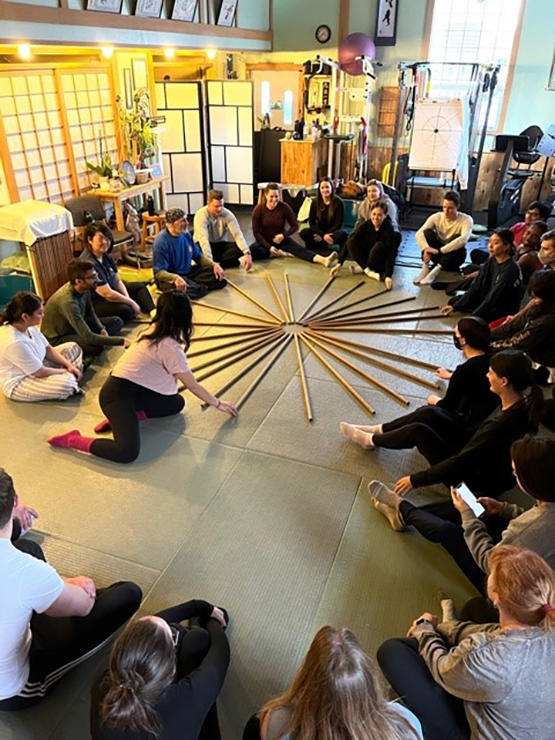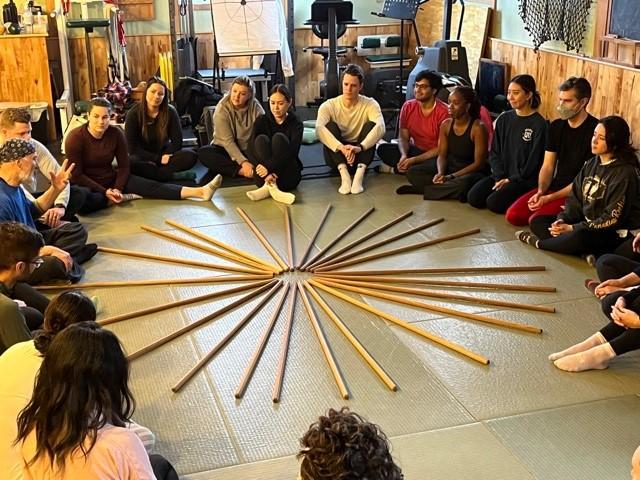Feb. 9, 2023
Haskayne researcher advocates for ninja training to help leaders deal with real-world complexities

The legendary Japanese ninja stayed calm and effective while dealing with fast-moving dangers, constant change and life-threatening scenarios. Taking inspiration from this, a Haskayne School of Business researcher is now advocating for MBA students to learn ninja philosophy to deal with the complexities they may face in the business world.
Dr. Julian Norris, PhD'09, an instructor in the Haskayne School of Business, says learning how to keep "ninja-cool" in stressful situations is an important skill for business leaders. In the first published paper discussing ninja training in management education, Norris describes how the learning needed for complexity leadership may require deep shifts in worldview that can be aided by transformative experiences that incorporate the body and not just the mind. The article, “Ninja Training Meets Management Education: Integrating Taijutsu into an MBA Complexity Leadership Course,” appears in the Journal of Management Education.

Julian Norris argues that exploring the power of taijutsu is one way to help students become more self-aware, less reactive and more conscious.
Photo supplied by Julian Norris
While scholars agree that leaders need humility, courage and tolerance for uncertainty in order to best deal with complex situations, there is no agreement on how best to cultivate these qualities in MBA students. Exploring concepts from taijutsu — literally “body technique” — is one way to address this “core challenge,” Norris says.
“You don't have access to the full range of your most skillful self under all circumstances, and perhaps when you most need it,” says Norris. “Imagine you are faced with cascading complexity and stress and anxious employees. You may need to be at your best, but your reactive self may actually be at its worst in those moments.”
Bringing leadership skills to bear in a tense situation is something Norris likens to the difference between singing along to a song while alone your car and having to perform the song in Carnegie Hall with “a thousand stern faces gazing up at you.” While you can easily belt out the song in private, on stage your body would tense up, your heart would pound and your voice would squeak. “You'd be completely unable to do this thing that, under another circumstance, you could do perfectly well,” he says.
Moving from the metaphorical stage to the classroom, Norris argues that exploring the power of taijutsu is one way to help students become more self-aware, less reactive and more conscious. “We are finding embodied ways to draw from martial arts traditions to help prepare a generation of leaders who can really thrive in high-stakes, complex environments, make wise decisions and bring their most skillful selves — the full spectrum of their intelligence — to bear when they most need it.”

Learning how to keep ninja-cool in stressful situations is an important skill for business leaders, says Julian Norris.
Photo supplied by Julian Norris
Straight-up force or power can be of little use in these scenarios. Rather, a leader needs to understand the dynamics and dig deep for the skills to deal with the situation. “The complexity which characterizes so much of our world is all about relational dynamics, about the connections between things, and being aware of those and moving skillfully with them,” Norris says.
Norris’ research explores several martial arts training drills that have been used in class for students to practise handling difficult situations. While not advocating that educators necessarily replicate the drills, Norris argues ninja training is one way of answering some of the big questions facing management education today.
“How do you go about cultivating curiosity and humility?” he says. “How do you teach people to access a flow state in which they're way more productive and able to adapt nimbly to rapidly changing circumstances? How do we educate people for the reality of the world and decision-making in very high-stakes situations? How do we give them not only the cognitive tools, but the capabilities that make those cognitive tools and skills come alive?”







